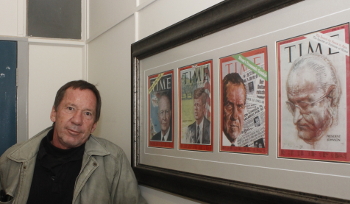Latest News Archive
Please select Category, Year, and then Month to display items
22 May 2020
|
Story Nitha Ramnath
![]()
A Virtual celebration of Africa Month
On 25 May 2020, Africa will celebrate the 57th anniversary of the founding of the Organisation of African Unity. A central tenet of the organisation, which was the predecessor of the African Union, is African solidarity. Member states undertook to coordinate and intensify their cooperation and efforts to achieve a better life for the people of Africa. The University of the Free State (UFS) has a long tradition of commemorating Africa Day and the ideas underpinning it. Every year, diverse events aimed at advancing African unity and solidarity take place during Africa Month – traditionally, the highlight is the Africa Day Memorial Lecture hosted by the University's Centre for Gender and Africa Studies.
This year, celebrating African unity through significant events involving the physical presence of a large number of people, will likely be impossible. COVID-19 is ravaging the world and Africa may become one of the world regions worst affected by the consequences of the virus. Social distancing may be difficult to achieve in a continent with densely populated urban centres that often feature large informal settlements. Besides, the economies of African nations are not as robust as those of other world regions. The challenge that Africa is facing, appears to be one that can only be mastered by its people acting in solidarity and unity. The continent has already developed an Africa Joint Continental Strategy for COVID-19 Outbreak to combat the virus, and an Africa Taskforce for Coronavirus has been established. The ideas of African togetherness and the underpinning philosophy of Ubuntu may be critical for strengthening African solidarity at a time when it may be more relevant than ever.
The commemoration of Africa Day takes a different theme each year. This year, the UFS 2020 Africa Month celebrations will take a virtual format, with the theme of ‘Africa together forever’ underpinned by the COVID-19 global pandemic. The theme is particularly significant considering the context of the African continent; and only through the demonstration of solidarity and unity can Africa overcome the challenges of the global pandemic.
The University will host a variety of cultural and intellectual contributions on the dedicated UFS virtual Africa Month website. On Africa Day (25 May 2020), a virtual Africa Day function, which will be posted on the website, will conclude the Africa Month commemorations.
The diverse contributions to the 2020 virtual Africa Month activities will highlight the University’s commitment towards creating a diverse, challenging intellectual environment. The UFS strives as a research-led university, to provide an environment in which new ideas are incubated and debated; contributing towards its transformation process and African unity.
Photo manipulation in journalism: evil, crutch or lifebuoy?
2017-09-04

Albe Grobbelaar, veteran journalist and lecturer in the
Department of Communication Science at the UFS.
Photo: Rulanzen Martin
Since the 1800s the manipulation of photographs has been common practice, and who can forget the OJ Simpson Time magazine cover in 1994? Albe Grobbelaar, lecturer in the Department of Communication Science at the University of the Free State (UFS), asked in a special lecture on 18 August 2017 whether “Photo manipulation in Journalism” was an evil habit, a crutch or a lifebuoy.
“As a journalist I have always been interested in photography. And the principle of photo manipulation or tampering with photos, as we call it, is something that has interested me ever since,” Grobbelaar said. Photo manipulation is an area that has garnered many academic interest and is not a new trend but a practice that started in the 1830s when photos came into popular use. “It is not always done with ulterior motives, artists played with photographs to get unique effects.” Photo manipulation is not only to create fake news, but is sometimes used to convey novelty and create shock to news readers.
Different viewpoints for different circumstances
He talked about the spectrum of viewpoints on photo manipulation. Some conservative journalism schools say photos should never be retouched while other feel it is fine to tamper with pictures. “What I tried to convey in the lecture was that one should consider different circumstances differently,” Grobbelaar said. As a journalist he believes that news photos should never be manipulated.
He mentioned the example of the mugshot of OJ Simpson that the Los Angeles Police Department released to the media. “Newsweek and Time both used the photo on their front pages, but Time deliberately darkened the picture so that OJ, a black man, would appear more sinister,” Grobbelaar said. It is, however, common practice in the fashion industry to retouch images that are used in fashion magazines.
Use own judgment to validate photos
In the age of social media it has become easy to manipulate photos and which has been labelled fake news. “I would advise people to use their own judgment when validating the authenticity of photos,” Grobbelaar said. It is important to verify whether they are from a reliable news outlet.